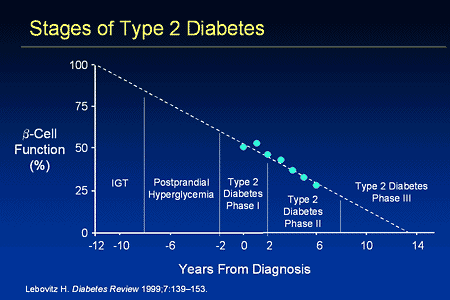phoenix
Expert
- Messages
- 5,671
- Type of diabetes
- Type 1
- Treatment type
- Pump
Some people who are newbies are not new to diabetes.Some people who are newly diagnosed may have had undiagnosed diabetes for a long time .
As Indy says beta cells can be lost . And of course there are people who may have been labelled as T2 but who actually produce less insulin. Beta cells may have been destroyed by the immune system (LADA), they may have a defect in the signalling system( some types of MODY) or something else entirely.
If insulin levels are low then glucagon levels will rise and gluconeogensis will increase .The liver will use protein or break down body muscle to make glucose (that's what happens in T1 before diagnosis but it can also in longstanding T2. It may also be that people are actually producing far more glucagon than they should do (so more glucose is being made/released.
In some of these cases then people may not be able to lower their levels with diet , of any kind ,without some form of medication ( for example metformin acts,in part, to reduce the glucagon response)
Can you imagine how someone in this situation would feel if they were told that they somehow weren't doing it right?
(in any case I can give examples where people use other diets successfully but that isn't the thrust of this thread.)
My second point is that in a minority of cases getting levels down as quickly as possible isn't necessarily a good thing.
In someone who has developed some degree of retinopathy, a rapid reduction of HbA1c may lead to a more rapid progression of the existing retinopathy. In the long term a lower level is certainly better but taking many months to get there may , according to this hospital website, be sensible .
http://www.diabeticretinopathy.org.uk/retinopathyprogression.htm
also from the same website :
Late diagnosis " is very common, even in wealthy areas such as North Birmingham. 15% of patients have retinopathy at presentation, and diabetes may have been present 5-9 years previously"
As Indy says beta cells can be lost . And of course there are people who may have been labelled as T2 but who actually produce less insulin. Beta cells may have been destroyed by the immune system (LADA), they may have a defect in the signalling system( some types of MODY) or something else entirely.
If insulin levels are low then glucagon levels will rise and gluconeogensis will increase .The liver will use protein or break down body muscle to make glucose (that's what happens in T1 before diagnosis but it can also in longstanding T2. It may also be that people are actually producing far more glucagon than they should do (so more glucose is being made/released.
In some of these cases then people may not be able to lower their levels with diet , of any kind ,without some form of medication ( for example metformin acts,in part, to reduce the glucagon response)
Can you imagine how someone in this situation would feel if they were told that they somehow weren't doing it right?
(in any case I can give examples where people use other diets successfully but that isn't the thrust of this thread.)
My second point is that in a minority of cases getting levels down as quickly as possible isn't necessarily a good thing.
In someone who has developed some degree of retinopathy, a rapid reduction of HbA1c may lead to a more rapid progression of the existing retinopathy. In the long term a lower level is certainly better but taking many months to get there may , according to this hospital website, be sensible .
http://www.diabeticretinopathy.org.uk/retinopathyprogression.htm
also from the same website :
Late diagnosis " is very common, even in wealthy areas such as North Birmingham. 15% of patients have retinopathy at presentation, and diabetes may have been present 5-9 years previously"


